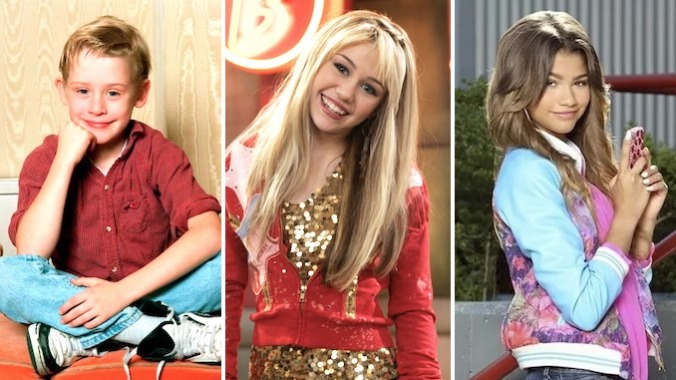Is the Era of the Child Star Over?
From Hannah Montana to Zendaya, we grew up with famous tweens on our screens, but kids today don't have that same representation

If you ask anyone who grew up in front of a TV in the 1990s or 2000s who their favorite child star was when they were a kid, they are sure to pick someone from a massive Rolodex of answers. A self-proclaimed ‘90s kid might throw out a name like Britney Spears, Jonathan Taylor Thomas, or Macaulay Culkin. Someone born on the cusp of the millennium could pull a name from a long list of children’s programming that aired during the first decade of the 21st century—Raven-Symoné, Miley Cyrus, Keke Palmer—and a person who falls solidly in the center of Gen Z may bring up Zendaya, China Anne McClain, or Skai Jackson.
The child star industrial complex was booming for almost three decades, giving Millennials and Generation Z tons of programming that they could see someone their age in. While recent conversations about representation have been focused (rightfully) on matters of race, disability, sexuality, and gender, there is also a conversation to be had about how we represent children in media. While it is not something we often talk about, all children are marginalized, regardless of race or class. They cannot exert any control over the world they live in no matter where they live because they are children, and that means that they are always at the mercy of adults when it comes to all matters.
Children deserve to see themselves on screen as much as anyone else, in programming that is written specifically for them—and, for a while, they did. The Disney Channel aired anywhere between 3 to 5 child-centric sitcoms in the 2000s with that number rising to as high as 9 in the mid-to-late 2010s. Combined with the live-action programming on Disney XD and a swath of Dan Schneider-led Nickelodeon shows, the child star factory churned along. Even kids with no cable in their home could watch TV at a friend’s house, and Hannah Montana, The Suite Life of Zack and Cody, iCarly, and Victorious were just a few of the shows that were the center of children’s pop culture.
Many of these actors started expansive careers in their teens that mirror the trajectories that members of the All-New Mickey Mouse Club shot off on. Miley Cyrus’ blonde alter ego broke onto the Billboard Hot 100 ten times while Hannah Montana was on the air and was the focus of both Hannah Montana: The Movie—a film that stars Taylor Swift pre-Grammy win and VMA incident—and a live concert movie that recouped its budget ten times over. Disney and Nickelodeon also built musical careers for Selena Gomez, Miranda Cosgrove, Demi Lovato, Jennette McCurdy, Victoria Justice, and anyone else who was a lead in a popular show or movie. At one point, all three leads of Hannah Montana were releasing music under Disney’s watch, and if you throw a dart at a wall of Disney kids who had a place on the channel anywhere from 2000 to 2017, you would probably hit someone with a single out. Disney also had a hand in boosting the careers of Justin Bieber and The Jonas Brothers by way of Radio Disney (which ceased operation in 2021), a place where clean versions of pop music played alongside Disney music from their theatrical feature films and child star prospects. Nickelodeon’s reach into the music space was far less impactful, but several songs that were produced for Big Time Rush and Victorious made their way onto the Hot 100 as well.
-

-

-

-

-

-

-

-

-

-

-

-

-

-

-

-

-

-

-

-

-

-

-

-

-

-

-

-

-

-

-

-

-

-

-

-

-

-

-

-








































